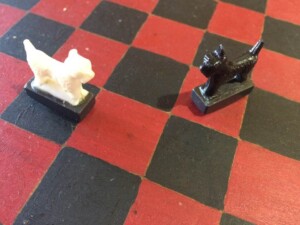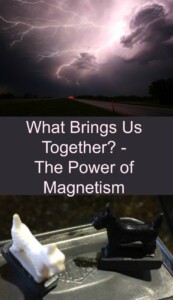What Brings Us Together? – The Power of Magnetism
What Brings Us Together? – The Power of Magnetism
As a child, one of my greatest delights during church was to be allowed to play with Tricky dogs. Those black and white dogs could keep a child entertained for the duration of the longest sermon! Grab a hymnbook, open the lid, slide one dog under the lid, place the other dog on top of the lid and wham! Around and around the top dog went, totally controlled by the one hiding under the inside of the hymnbook cover!
It was also fun to place both dogs on top of the cover and have the black dog repel the white one back to the other side of the cover—all by magnetic force. What power!

Magnetism is an invisible force of nature, but a force with results that can be easily seen just by watching these simple Tricky dog toys. We are like magnets, finding ourselves pulled or pushed by others. We are prone to be involved in cliques, becoming polarized* by a cause, an issue, or an emotion.
It happens in families, in churches, and at work. Think about it. How many times do you hear a suggestion for something, but you want to know whose idea it was before you decide whether you like the idea or can support it? After all, depending on who said it, your viewpoint may change. Like that Tricky Dog on the top cover of the hymn book, we allow ourselves to be influenced and moved by the powerful pull of those with whom we bond.
The good and the bad of bonding, magnetism, and polarization
Bonding can be good. Sad is the family, church, or work setting that experiences no bonding. Yet the crux of the matter is that sometimes our bonding is more about polarization than about true emotional health.
Along with polarization, we find ourselves getting on bandwagons that we have no business riding. Look at the bandwagons that formed during last year’s political climate. Folks didn’t even know who was driving the wagon or where it was heading. In the heat of a moment, folks gravitated toward an emotion without checking out facts. Suddenly, they were aboard a wagon they previously had never considered riding.
What makes us choose which side to take, which wagon to ride, which magnet to claim, which totem pole to cling to?
It’s true that we tend to gravitate toward those with whom we feel a commonality. Sometimes blood draws us; sometimes it’s our interests or our beliefs and practices. These can all be good.
Could it also be that sometimes we gravitate toward those who are hurting like we are, those who have a vendetta against another group like we do, or those who feel a need for vindication?
We see it among us as we take sides with issues like voting and vaccines, dieting and doctors, Plexus and politics, birthing and breastfeeding, homeschooling and health, or courtship and church.
Prejudices influenced by magnetism
We allow prejudices to influence our interactions. This problem is as old as Bible times.
Paul and Barnabas had such a sharp dissension that they actually parted ways. (Acts 15:16-41). On their missionary trip, Barnabas wanted to take John Mark but Paul refused. It wasn’t a doctrinal issue, but an issue of John Mark’s commitment. Scripture says that their disagreement was sharp. People took sides. Paul chose Silas to accompany him and Barnabas took John Mark. There’s hope for our polarization. In 2 Timothy 4:11, Paul asks Timothy to bring John Mark with him to see him “because he is useful to me in my ministry.” At the time, though, you couldn’t have convinced any of them otherwise. It’s true that God used their disagreement to have two missionary teams go forth—but one wonders what more might have happened if the dissension had never happened. Certainly, their sharp disagreement could not have been pleasing to God, for neither was ‘esteeming others better than themselves.’
As women, we can influence the tides of polarization. We can choose to identify with those we like and with whom we feel a connectedness whether or not they are Biblical. On the other hand, we can help others (as well as ourselves) in sorting through the emotions and finding facts, thus depolarizing our responses so that they are Christ-like.
Carrying a grudge for a friend, a sibling, or a spouse brings polarization. It happens so readily, oftentimes without realizing what we are actually doing. Too many times we choose loyalty over Truth. We side with someone because of our relationship to them (whether it’s genetics or some other group scenario) instead of reckoning with actual truth and then taking a stand for what is Christ-like.
Rather than allowing others to think differently on a subject, we badger and try to get them to come to our side simply because we need others to be on our team. Often, we are not motivated by a sense of God’s call for this behavior, but rather by our own desire to be right and in the majority. That’s what polarization does. In our competitiveness, we want to outrank others. We gun them down in an effort to make sure that our side is right and other sides are wrong.
Misery loves company, and women especially seem to feel the need to have others commiserate with them—whether it’s about relationships, agendas, or clannishness. Why is it that we can’t seem to allow others to have their opinion on things without accumulating more mud to sling as our wagon wheels sludge through the slop of our own making?
Oftentimes in our own misery, we find others to support our agenda because it will take the focus off our own inadequacies. This is not the way of non-resistant love. When we find ourselves uncomfortable or miserable in our spirits, perhaps it’s time to take inventory of our hearts.

Choosing Wisdom over magnetism
Choose Wisdom in the choices you make that draw you to others. Seriously consider how you think God views your relationships and your choices:
- Consider the friends you keep (or won’t keep). Ask yourself why you need this friend. Do you choose your friends because they help you grow in peace and in joy, or because you’re comfortable being in their circle, in the status quo?
- Consider the agendas you champion. Ask yourself what makes them so important to you. Do you choose these agendas to further the Kingdom of Christ or for some other reason?
- Consider the sides you take. Ask yourself if you are choosing sides because they speak Truth, or because the folks in your circle are on this side of the issue.
- Consider the goals you have. Ask yourself if these goals push you to find Jesus Christ or to elevate or validate your own circle
The choices we make will affect us not just now, but also for Eternity. Whether we like it or not, our choices—and polarization—affect others as well. Be sure the bonds you make are ones that help you become more like Jesus.

This article was first published in Daughters of Promise magazine. For more information about this quarterly magazine, click here.







“Be sure the bonds you make are ones that help you become more like Jesus.”
Yes. Yes.
Just exactly what I needed to hear. Thank you.
Powerful words, Gert, and so true!